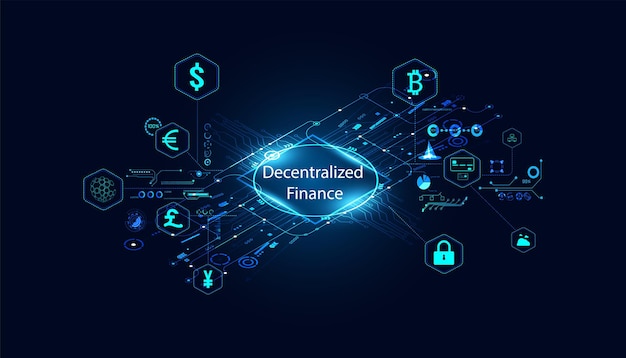Introduction
In recent years, the term “Decentralised Finance” or DeFi has garnered significant attention in the blockchain and cryptocurrency space. DeFi refers to a range of blockchain-powered applications that aim to provide peer-to-peer alternatives to traditional financial services and institutions. This innovative approach to finance has gained momentum, attracting substantial capital and positioning itself as one of the leading trends of 2022. In this comprehensive guide, we will explore the key concepts, benefits, and use cases of DeFi, shedding light on its potential to revolutionize the financial industry.

Understanding Decentralised Finance
Decentralised Finance, often referred to as DeFi, is based on the principles of decentralization and blockchain technology. The concept revolves around eliminating intermediaries and central oversight, making financial markets more accessible to retail investors, and creating new investment opportunities. DeFi applications typically run on Ethereum, the second-largest blockchain protocol after Bitcoin, which provides a permissionless and highly decentralized platform for building these innovative applications.
The Benefits of Decentralised Finance
DeFi offers numerous benefits to customers and investors alike. Let’s delve into some of the key advantages that make decentralised finance such an attractive proposition.
1. Democratization of Financial Services
At the core of decentralised finance is the aim to democratize banking and finance. By leveraging blockchain technology and its decentralized nature, DeFi ensures that financial services are easily accessible to everyone. This inclusivity removes barriers to entry and empowers individuals who were previously excluded from traditional financial systems.
2. Transparency and Trust
Another significant benefit of DeFi is the transparency it brings to financial transactions. Blockchain’s distributed ledger ensures that transaction history is shared among all network participants, making it publicly available for inspection. This transparency improves due diligence, helps identify potential scams, and promotes trust among users.

3. Immutability and Security
Blockchain technology ensures immutability through cryptography and consensus algorithms. This means that once a transaction is recorded on a blockchain, it becomes virtually impossible to manipulate or alter the records. In the context of DeFi, this immutability provides an added layer of security, protecting users from fraudulent activities and bad actors.
How DeFi Can Help the Financial Services Sector
Decentralised Finance has the potential to not only improve existing financial systems but also enable entirely new types of financial products and services. Let’s explore some of the most prominent use cases of DeFi that are transforming the financial services sector.
1. Lending and Borrowing
DeFi has revolutionized the lending and borrowing landscape by enabling peer-to-peer lending platforms. These platforms leverage smart contracts and cryptographic verification mechanisms to eliminate intermediaries like banks, making the lending and borrowing process faster, cheaper, and more secure. One popular DeFi lending platform is Compound, which allows users to supply their crypto assets to lending pools for others to borrow from, earning interest on their contributions.
2. Savings and Yield Farming
DeFi lending platforms have also opened up new opportunities for individuals to grow their savings. By locking their crypto assets into lending protocols, users can earn interest on their holdings. This has led to the emergence of DeFi savings apps that maximize users’ ability to earn interest by plugging into different lending protocols. The practice of moving assets across various lending protocols to maximize returns is known as yield farming.
3. Tokenization
Tokenization is a significant trend enabled by DeFi. It involves the issuance of digital assets, known as tokens, on a blockchain network. These tokens can represent a wide range of assets, including utility tokens for specific DeFi applications, security tokens akin to digital shares, and even tokens that represent fractional ownership of physical properties. Tokenization provides greater liquidity, accessibility, and flexibility in managing assets.

4. Stablecoins
Stablecoins play a crucial role in the DeFi ecosystem. These are crypto tokens pegged to stable assets, such as fiat currencies or commodities, to minimize price volatility. Stablecoins provide a bridge between traditional finance and the world of cryptocurrencies, allowing for seamless remittance, lending and borrowing, and other DeFi services. There are different types of stablecoins, including collateralized stablecoins, which are backed by assets, and non-collateralized stablecoins that maintain their value algorithmically.
5. Decentralized Exchanges (DEXes)
Decentralized exchanges (DEXes) are platforms that facilitate peer-to-peer trading of digital assets. These exchanges operate without intermediaries and rely on smart contracts to execute trades securely and efficiently. Uniswap, one of the major players in the DeFi space, is a prime example of a decentralized exchange that enables seamless and permissionless trading.
Conclusion
Decentralised Finance (DeFi) has emerged as a disruptive force in the financial industry, offering a range of innovative solutions that challenge traditional financial systems. Its core principles of decentralization, transparency, and security make it an attractive proposition for individuals seeking alternative financial services. DeFi has already demonstrated its potential in areas such as lending and borrowing, savings, tokenization, stablecoins, and decentralized exchanges. As the DeFi ecosystem continues to evolve, it is poised to reshape the financial landscape, providing greater accessibility, efficiency, and inclusivity. Embrace the future of finance with DeFi, and explore the endless possibilities it brings.
At BitFlow, we are enthusiastic about the future of DeFi and eager to contribute to its success. If you have an idea for a groundbreaking DeFi app, let’s discuss how we can help you bring it to life. Together, we can leverage the power of decentralization and blockchain technology to revolutionize the financial industry. #bitflow #exchange #decentralizedfinance
